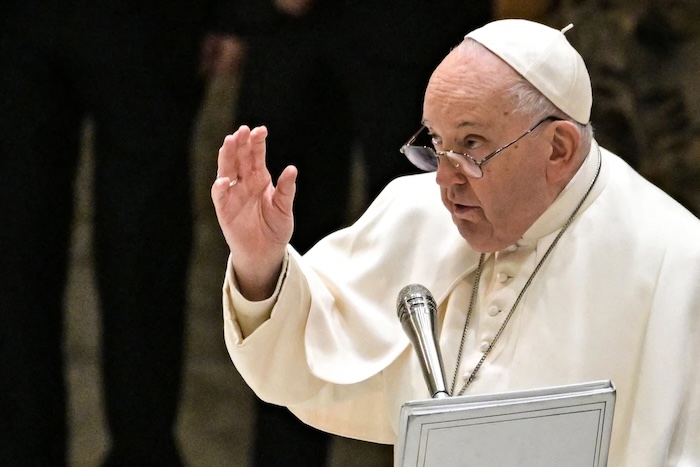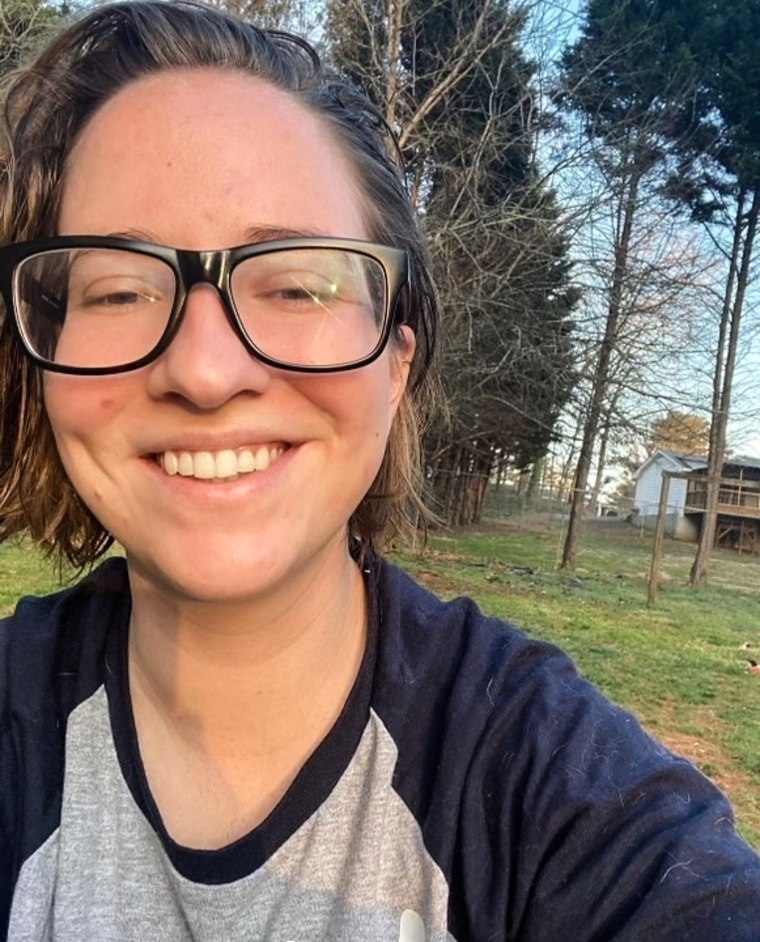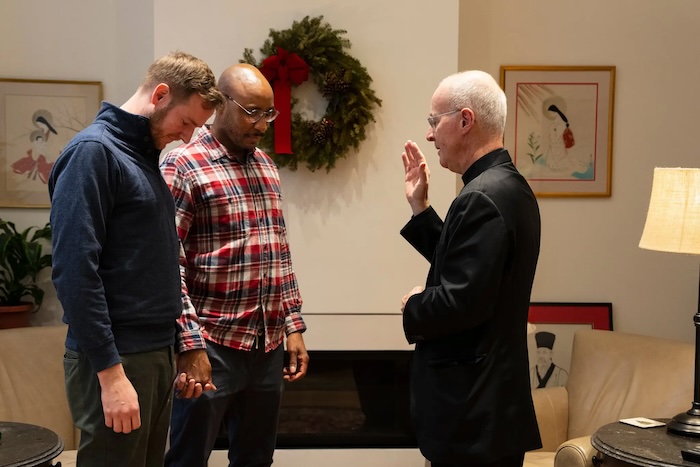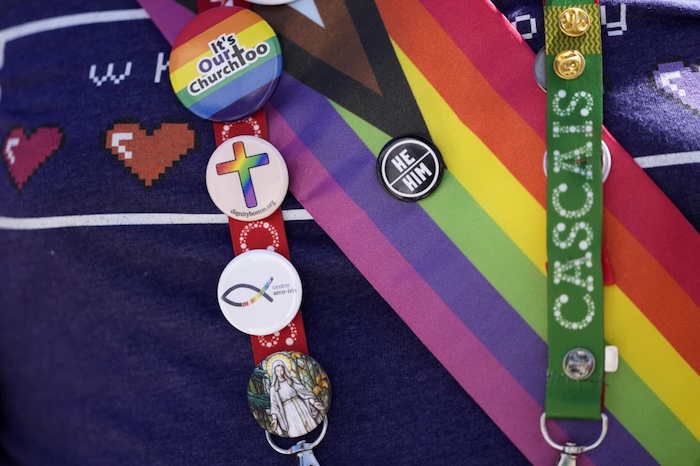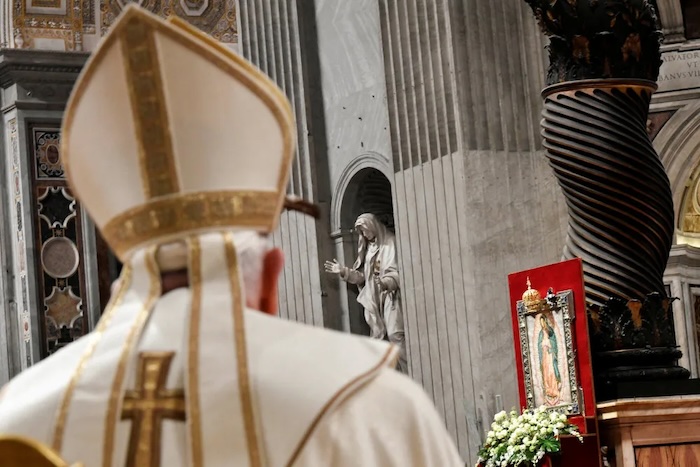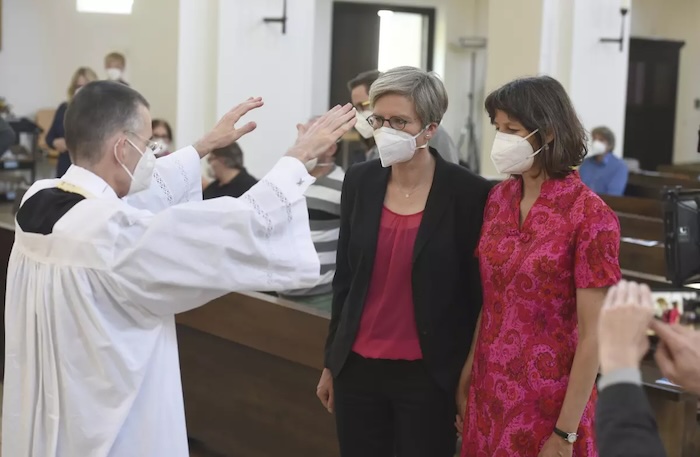
By NICOLE WINFIELD
Pope Francis’ green light for Catholic priests to offer blessings to same-sex couples is in many ways a recognition of what has been happening in some European parishes for years. But his decision to officially spell out his approval could send a message of tolerance to places where gay rights are far more restricted.
From Uganda to the United States, laws that discriminate against LGBTQ+ people or even criminalize homosexuality have increased in recent years, leaving communities feeling under attack. Pastors in some conservative Christian denominations, and the Catholic Church in particular, have sometimes supported such measures as consistent with biblical teaching about homosexuality.
In Zimbabwe, a country with a history of state harassment of LGBTQ+ people and a constitutional ban on same-sex marriage, news of Francis’ approval was met with cautious optimism among activists.
But Chesterfield Samba, director of Zimbabwe’s GALZ association, which represents LGBTQ+ people, said same-sex unions would likely remain taboo regardless of the pope’s stance.
“Christians here are of the view that they are devoid of sin and cannot be aligned with LGBTQ+ people,” Samba told the Associated Press.
By contrast, a Catholic priest in the United States — Alex Santora of Hoboken, N.J. — was elated by the pope’s declaration, hoping it would clear the path for him to bless a same-sex couple who had been part of the parish throughout his 19-year tenure there.
The Vatican says gay people should be treated with dignity and respect but that homosexual acts are “intrinsically disordered.” Francis hasn’t changed that teaching, but he has spent much of his 10-year pontificate offering a more welcoming attitude to LGBTQ+ Catholics.
The Vatican statement Monday marked a new step in Francis’ campaign, explicitly authorizing priests to offer non-sacramental blessings to same-sex couples. The blessings must in no way resemble a wedding, which the church teaches can only happen between a man and a woman.
The Rev. Wolfgang Rothe, a German priest who participated in open worship services blessing same-sex couples in May 2021, said Tuesday that the approval essentially validated what he and other priests in Germany have been doing for years. But he suggested it would make life easier for homosexual couples in more conservative societies.
“In my church, such blessings always take place when anyone has the need,” Rothe said.
But “in many countries around the world there are opposing moves to maintain homophobia in the church,” he added. “For homosexual couples living there, the document will be a huge relief.”
In Nigeria, authorities arrested dozens of gay people in October in a crackdown that human rights groups said relied on a same-sex prohibition law.
Nigeria is among 30 of Africa’s 54 countries where homosexuality is criminalized with broad public support, though its constitution guarantees freedom from discrimination.
Uganda’s president this year signed into law anti-gay legislation that prescribes the death penalty for “aggravated homosexuality,” which is defined as sexual relations involving people infected with HIV, as well as with minors and other vulnerable people.
In the United States, the Human Rights Campaign has identified an “unprecedented and dangerous” spike in discriminatory laws sweeping statehouses this year, with more than 525 anti-LGBTQ+ bills introduced.
“Given the homophobic and transphobic climate created by many bishops in the United States, the average same-sex couple likely still won’t feel comfortable presenting themselves to their local bishop or priest to ask for a blessing,” said Jamie Manson, a lesbian and president of Catholics for Choice.
Starting from his famous “Who am I to judge” comment in 2013 about a purportedly gay priest, Francis has evolved his position to increasingly make clear that everyone is a child of God, is loved by God and welcome in the church.
In January, Francis told the Associated Press: “Being homosexual is not a crime.”
Raul Peña, a spokesman for Crismhom, Madrid’s main Catholic LGBTQ+ association, said small-town, conservative dioceses in rural Spain could benefit from Francis’ message.
“If the priest from your town talks about gays being the devil in his sermons each Sunday, which some priests do, now you have the pope signing a document saying that homosexuals who live as a couple can be blessed,” he said. “It’s a fundamental step for those hierarchies and for those people who are in places where being LGBT is difficult.”
Santora, pastor of the Church of Our Lady of Grace in New Jersey, said the pope’s declaration would be welcome in a parish that celebrates an annual Pride Mass and has many LGBTQ+ parishioners.
“This is a very important step, people realizing the church is finally recognizing the goodness of their lives,” he said.
Santora wants to set a date soon to bless a same-sex couple that has been part of the church for many years. Santora recently learned that they had yearned for his blessing but feared getting him in trouble.
“So this comes at the right time,” the priest said. “It’s a new way to set a date.”
Santora worries, though, that some gay and lesbian Catholic couples in the U.S. won’t be so fortunate.
“There are priests, many of them young, who are behind the times — they won’t do this,” he said. “It’s going to cause more hurt in some communities.”
Gary Stavella, a 70-year-old retiree, helps lead the LGBTQ+ outreach ministry at Our Lady of Grace.
He said he was elated by the pope’s declaration, particularly on behalf of LGBTQ+ Catholics in countries where homosexuality is criminalized.
“There are a lot of anti-LGBTQ cardinals in those countries, and in ours,” Stavella said. “For their boss to say, ’You can’t condemn them, you should bless them’ is a sea change. It can save lives.”
Antonella Allaria, who lives in New York City with her wife, Amanda, and their 6-month-old son, said the pope’s decision is a positive step for her family and the church as a whole.
“I’m gay and it’s OK to be a person and to be gay. Where before yesterday, in the Catholic Church, it was not that OK,” she said. “I feel things are getting normalized. And it’s about time.”
Kimo Jung of Pittsburgh, a lifelong Catholic, met his future husband 34 years ago when they both attended a New York parish. Jung, 60, sees the Vatican declaration as monumental for the church, but less so for himself and his husband, whom he married in a civil ceremony in 2016.
“I would certainly ask my friends who are priests to convey such a blessing, but I wouldn’t approach any other church official to demand a rite to be blessed, because I already know God has blessed my relationship.”

